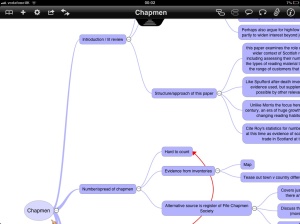As we near the end of another year and approach the start of a new one I thought I’d blog about my academic goals for the year ahead. This is partly inspired by Academic Writing Month, where I found stating goals very motivational for completing them. Hopefully the same technique will work on a year’s rough goals.
I’m going to list the goals below. These are very rough specifications of things I’d like to do, usually without any specific timescale. I’d like to view this is an aspirational list, a menu that I can pick and choose things from as I am able to.
- Complete chapmen paper by March and submit before 1st April 2013 if of suitable length and quality.
- Write possible talk for archivists’ conference in April, whether my proposal is accepted or not.
- Complete kirk session library borrowings transcribing and use this as basis for a pilot study for a possible future larger-scale project linking library borrowings to rich genealogical records from the 19th century such as census returns. Aim is to see how practical it is to work with the records in this way, in terms of time and complexity, and what sort of results it might offer. Will write the results of this process up in the form of a paper and aim to submit it.
- Catch up with academic reading: I have a huge backlog of some very important things I need to read, both shorter papers and longer books. Reading print is quite a challenge for me now, due to the progressive neurological disease, but I must try to reduce the to-read pile in 2013.
- (Related to above) Update my EndNote database of things read. As a historian I don’t find EndNote at all useful for automatically generating references in footnotes or endnotes – it gets the formats wrong, and even when I make up my own special styles to suit in-house styles it’s still not flexible enough for many of the things I need to refer to. But it’s fantastic for remembering what I’ve read – way better than me at it – and I use its rich database potential to type up notes about things read, and categorise by keywords. I just need to add some things I’ve read more recently and not put into EndNote.
- Complete paper based on the dissertation project in the family & community history honours course in my Open University BA degree. I think this is publishable, with some extra contextualisation. I’m going to give it a go anyway.
- Tidy away my piles of research material from my PhD. These are still taking up space in my study, years later. I need to sort through them, extract anything useful, then file them away (if they fit!) in a cupboard.
- Attend more history departmental research seminars at Dundee. I’ve been too ill over recent months to attend any, but there are some particularly interesting ones coming up, and it’s too good a chance to miss to catch up with recent interesting research. There’s one that’s particularly appealing soon, that ties in to my recent paper submission to Past & Present.
- (Possibly, if I’m still strong enough to tackle this afterwards) Send my husband to a local archive, with digital camera, to photograph a large run of 19th and 20th century library borrowings, which I’d like to transcribe and analyse. This would be for the bigger project following from the kirk session pilot study, and is rather contingent on how well that goes.

